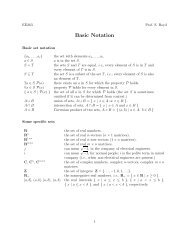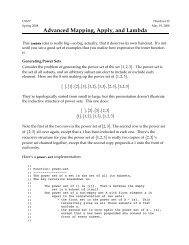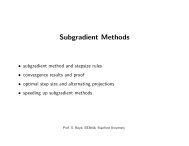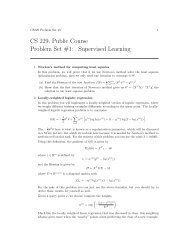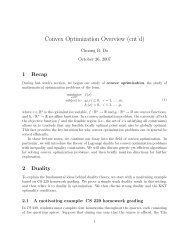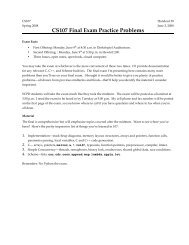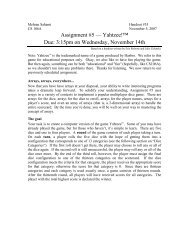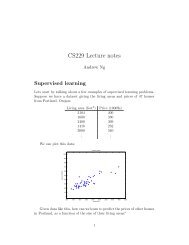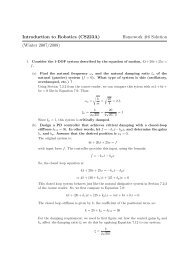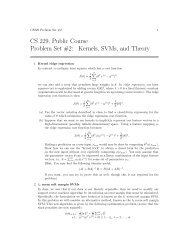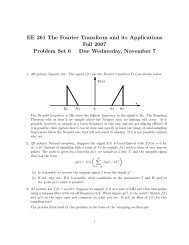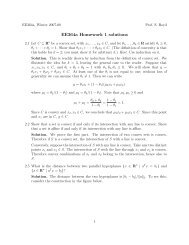CS107 Final Exam Practice Problem Solutions - Stanford ...
CS107 Final Exam Practice Problem Solutions - Stanford ...
CS107 Final Exam Practice Problem Solutions - Stanford ...
- No tags were found...
You also want an ePaper? Increase the reach of your titles
YUMPU automatically turns print PDFs into web optimized ePapers that Google loves.
<strong>CS107</strong>Handout 38SSpring 2008 June 2, 2008<strong>CS107</strong> <strong>Final</strong> <strong>Exam</strong> <strong>Practice</strong> <strong>Problem</strong> <strong>Solutions</strong>Solution 1: Matchmaking/*** The primary assumption is that both boys and girls* are C vectors of dynamically allocated C strings, each* initialized as follows.** vector boys, girls;* VectorNew(&boys, sizeof(char *), StringFree, 0);* VectorNew(&girls, sizeof(char *), StringFree, 0);** generateAllCouples creates a new C vector of couples* and inserts one such record on behalf of every possible* mapping of boy to girl. The couples own their own strings,* so that none of the three vectors share any memory whatsoever.* Assume that CoupleFree is the VectorFreeFunction that disposes* of couple records embedded in a vector, and assume it just works.*/typedef struct {char *girl;char *boy;} couple;vector generateAllCouples(vector *boys, vector *girls){vector couples;VectorNew(&couples, sizeof(couple), CoupleFree, 0);int i, j;couple item;for (int i = 0; i < VectorLength(boys); i++) {for (int j = 0; j < VectorLength(girls); j++) {item.boy = strdup(*(char **) VectorNth(boys, i));item.girl = strdup(*(char **) VectorNth(girls, j));VectorAppend(&couples, &item);}}}return couples;Solution 2: Extending the vectortypedef struct {void *elems;// pointer to elemsize * alloclength bytes of memoryint elemsize; // number of bytes dedicated to each client elementint loglength; // number of elements the client is storingint alloclength; // number of elements we have space forVectorFreeFunction free; // applied to elements as they are removed} vector;typedef bool (*VectorSplitFunction)(const void *elemAddr);void VectorSplit(vector *original, vector *thoseThatPass,vector *thoseThatFail, VectorSplitFunction test)
2{int i;void *elem;VectorNew(thoseThatPass, original->elemsize, original->free, 0);VectorNew(thoseThatFail, original->elemsize, original->free, 0);for (i = 0; i < original->loglength; i++) {elem = VectorNth(original, i);VectorAppend((test(elem) ? thoseThatPass : thoseThatFail), elem);}}original->loglength = 0; // leave memory there…Solution 3: Spice Rackclass spice {line 1line 2spice *& saffron(spice& salt);short sage(int cumin, spice rosemary) {cumin *= thyme[cumin - *(char *)thyme];return ((spice *) &parsley)->saffron(rosemary)->parsley - &rosemary;}};short thyme[4];spice *parsley;rosemary.parsleyrosemary.thyme[2…3]// line 1R1 = M[SP + 8];R2 = M[SP + 4];R3 =.1 M[R2];R4 = R1 – R3;R5 = R4 * 2;R6 = R2 + R5;R7 =.2 M[R6];R8 = R1 * R7;M[SP + 8] = R8;rosemary.thyme[0…1]// load old cumin// load this aka &this->thyme[0]// load first byte of this->thyme[0] cumin// compute index// scale by sizeof(short)this// compute address of rhs// compute rhs// compute new cumin value// flush to space for cuminsaved pc// line 2R10 = M[SP + 4]; // load this (again)R11 = R10 + 8; // compute &this->parsley (and look, it’s a spice * now)R12 = SP + 12; // prepare address of rosemary (which gets passed by ref)SP = SP – 8;// make space for paramsM[SP] = R11;// set down address of receiving objectM[SP + 4] = R12; // set down address backing salt referenceCALL SP = SP + 8;// clean up paramsR13 = M[RV]; // RV has spice ** backing spice *&, load real spice *R14 = M[R13 + 8]; // load value of parsleyR15 = SP + 12; // load &rosemaryR16 = R14 – R15; // compute raw number of bytes in between the twoRV = R16 / 12; // scale back to quantum number of spice records between themRET;
3Solution 4: Carsclass car {line 1line 2char **operator[](const char *);car& dochudson(car& sally, int fillmore){sally["Pixar"][fillmore] += *mater;return (*(car **)mcqueen)->mcqueen[3];}};short mater[4];car *mcqueen;// sally["Pixar"][fillmore] += *mater;R1 = M[SP + 8];SP = SP – 8;M[SP] = R1;M[SP + 4] = 1000;CALL // RV has a char **SP = SP + 8;8saved pcfillmoresallythisSPR1 = M[SP + 12]; // load fillmoreR2 = R1 * 4; // scale fillmore by sizeof(char *)R3 = RV + R2; // compute address of char * to be advancedR4 = M[SP + 4]; // load thisR5 =.2 M[R4]; // load this->mater[0]R6 = M[R3]; // load old value of char *R7 = R6 + R5; // compute new value of char *M[R3] = R7; // done!// return (*(car **)mcqueen)->mcqueen[3];R1 = M[SP + 4]; // load this (yes, again!)R2 = M[R1 + 8]; // load this->mcqueen (and look.. it’s a car **)R3 = M[R2]; // load *(car **)(this->mcqueen)R4 = M[R3 + 8]; // load *(car **)(this->mcqueen)->mcqueenRV = R4 + 36; // populate RV *(car **)(this->mcqueen)->mcqueen + 3RET;// leave Solution 5: Marriage And Mappinga)(define (marry singles-list)(if (
4Solution 6: Longest Common Subsequencesa);;;; Function: longest-common-prefix;; -------------------------------;; Takes two lists and returns the longest prefix common;; to both of them. If there is no common prefix, then;; longest-common-prefix evaluates to the empty list;;;; <strong>Exam</strong>ples:;; (longest-common-prefix '(a b c) '(a b d f)) --> (a b);; (longest-common-prefix '(s t e r n) '(s t e r n u m)) --> (s t e r n);; (longest-common-prefix '(1 2 3) '(0 1 2 3)) --> ();;(define (longest-common-prefix seq1 seq2)(cond ((or (null? seq1) (null? seq2)) '())((not (equal? (car seq1) (car seq2))) '())(else (cons (car seq1)(longest-common-prefix (cdr seq1) (cdr seq2))))))b);;;; Function: mdp;; -------------;; Mapping routine which transforms a list of length n into another;; list of length n, where each element of the new list is the result;; of levying the specified func against the corresponding cdr of;; the original.;;;; <strong>Exam</strong>ples:;; (mdp length '(w x y z)) --> (4 3 2 1);; (mdp cdr '(2 1 2 8)) --> ((1 2 8) (2 8) (8) ());; (mdp reverse '("ba" "de" "foo" "ga")) -->;; (("ga" "foo" "de" "ba") ("ga" "foo" "de") ("ga" "foo") ("ga"));;(define (mdp func sequence)(if (null? sequence) '()(cons (func sequence) (mdp func (cdr sequence)))))c);;;; Function: longest-common-sublist;; --------------------------------;; Analyzes the two sequences and computes the longest sublist that's;; common to both of them. If there are no common elements at all, then;; the empty list is returned.(define (longest-common-sublist seq1 seq2)(car (quicksort (generate-all-sublists seq1 seq2) list-length>?)));;;; Function: generate-all-sublists;; -------------------------------;; Uses double mdpping to pair every suffix of the;; first sequence with every suffix of the second,
5;; generating the longest prefix common to each of them.;; The apply append is needed, because each cdr is mapped;; to a list of all sublists that are prefixes of that;; cdr.;;(define (generate-all-sublists seq1 seq2)(apply append (mdp (lambda (suffix1)(mdp (lambda (suffix2)(longest-common-prefix suffix1 suffix2))seq2))seq1)));;;; Function: list-length>?;; -----------------------;; Returns #t if and only if the first list;; has more top-level elements than the second,;; and returns #f otherwise.;;(define (list-length>? ls1 ls2)(> (length ls1) (length ls2)))Solution 7: File Sharingint DownloadMediaFile(const char *server, const char *file);int DownloadMediaLibrary(const char *server, const char *files[], int numFiles){int i, totalNumBytes = 0;Semaphore byteCountLock = SemaphoreNew("Byte Count Lock", 1);Semaphore numThreadsAllowed = SemaphoreNew("Threads Allowed", 12);Semaphore numThreadsCompleted = SemaphoreNew("Num Threads Completed", 0);for (i = 0; i < numFiles; i++)ThreadNew("Downloader, DownloadThread, 6, server, files[i],&totalNumBytes, byteCountLock,numThreadsAllowed, numThreadsCompleted);for (i = 0; i < numFiles; i++)SemaphoreWait(numThreadsCompleted);}return totalNumBytes;void DownloadThread(const char *server, const char *filename,int *totalByteCountp, Semaphore byteCountLock,Semaphore numThreadsAllowed, Semaphore numThreadsCompleted){int numBytes;SemaphoreWait(numThreadsAllowed)numBytes = DownloadMediaFile(server, filename);SemaphoreSignal(numThreadsAllowed);}SemaphoreWait(byteCountLock);*totalByteCountp += numBytes;SemaphoreSignal(byteCountLock);SemaphoreSignal(numThreadsCompleted);
6Solution 8: Concurrent, Short-Circuit Evaluation of Scheme’s andtypedef struct {enum { Boolean, Integer, String, Symbol, Empty, List} type;char value[8]; // value[0] stores '\0' for #f, anything else for #t// above eight bytes are general-purpose bytes…} Expression;typedef struct {Semaphore lock;Semaphore answerReady;Semaphore answerAccepted;Expression *answer;int numChildrenRemaining;} AndExpressionInfo;/*** Function: evaluateConcurrentAnd* -------------------------------* Special function dedicated to the implementation of the* concurrent-and special form. It returns the first #f Expression* ever produced by a child, or if #f is never produced, then it* returns the last Expression * produced by the last thread* to complete.** @param exprs an array of Expressions * to be concurrently evaluated.* We assume there are no recursive calls to concurrent-and* involved.* @param n the length of the exprs array* @return the result of the last child thread needed in order to produce* an answer.*/Expression *evaluateConcurrentAnd(Expression *exprs[], int n){AndExpressionInfo *info = malloc(sizeof(AndExpressionInfo));info->lock = SemaphoreNew("Lock", 1);info->answerReady = SemaphoreNew("Answer Available", 0);info->answerAccepted = SemaphoreNew("Answer Accepted", 0);info->answer = NULL;info->numChildrenRemaining = n;for (int i = 0; i < n; i++) {char threadName[128];sprintf(threadName, "Sub-expression Thread %d", i + 1);ThreadNew(threadName, evaluateExpressionThread, 2, exprs[i], info);}}SemaphoreWait(info->answerReady);Expression *answer = info->answer;SemaphoreSignal(info->answerAccepted);return answer;void evaluateExpressionThread(Expression *expr, AndExpressionInfo *info){Expression *result = evaluateExpression(expr);
SemaphoreWait(info->lock);bool lastToFinish = (--info->numChildrenRemaining == 0);if (info->answer == NULL) {if (lastToFinish ||result->type != Expression::Boolean || result->value[0] == '\0') {info->answer = result;SemaphoreSignal(info->answerReady); // signal parentSemaphoreWait(info->answerAccepted); // stall until parents reads answer}}SemaphoreSignal(info->lock);7}if (lastToFinish) { // must free here (or at least outside the parent thread)SemaphoreFree(info->lock);SemaphoreFree(info->answerReady);SemaphoreFree(info->answerAccepted);free(info);}



